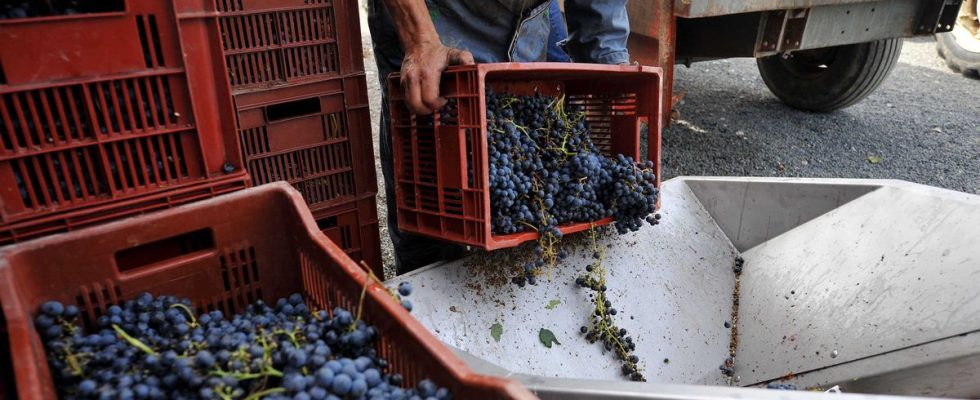This Friday, October 13, the Libourne public prosecutor’s office opened a judicial investigation for human trafficking against seven people. Implicated for having employed dozens of people of Romanian origin in undignified conditions, including a 14-year-old minor, in the Bordeaux vineyards, they were placed in pre-trial detention.
Having come to work for one or two months in France, with no intention of settling, these Romanian workers live on 20 euros per week to eat and pay 1.50 euros per minute spent on the phone. “They are treated like cattle,” says Elodie Blier, deputy prosecutor in Libourne. The seats of the Mercedes van in which they are transported have been removed at the rear, to be able to transport them in greater numbers.” They sleep together on a mattress in substandard accommodation, for which they still have to pay rent
The Libourne public prosecutor’s office takes these cases very seriously, which have been on the rise in the department in recent years. “Victims are often unaware of the legislation,” explains the deputy prosecutor of Libourne. It is not often done to file a complaint because it takes time and you have to trust the authorities. » The offense of trafficking in human beings is relatively recent in the Penal Code, since it only dates back to 2013. “But it is a virtuous circle because we communicate about what we do and there is when even more victims who push the doors of the gendarmerie,” estimates the magistrate.
Unscrupulous intermediaries
It is never the châteaux which recruit employees directly, as could have been the case several decades ago, but subcontracted agricultural service providers. “We are on an economic model in Gironde where all the clients, large châteaux or small operators, use service providers,” explains Alexandre Arrivets, deputy director of work at the departmental directorate of employment, work and solidarity (DDETS) of Gironde.
The fight against trafficking in the wine sector was one of the priorities of the departmental anti-fraud operational committee (CODAF) for the year 2023. Under his control, ten joint coordinated operations took place this year, in addition to those carried out conventionally, in the wine sector in Gironde. “Some 44 service provider companies and eight principals were inspected and the employment and housing conditions of 700 employees were verified,” specifies Alexandre Arrivets.
Housing, the gateway to characterizing trafficking
“We seek accommodation each time when we open an investigation because this makes it possible to characterize trafficking, while unworthy working conditions are more difficult to characterize,” explains the magistrate. Agricultural service providers are also often the landlords of wine workers and it is then up to the Labor Inspectorate to make findings relating to housing conditions (proposed surface area, ventilation, electrical standards, etc.) which will be valuable for the investigation. .
“The Labor Inspection services will check employment contracts and, where applicable, whether they refer to accommodation conditions,” explains Thierry Bergeron, departmental director of the departmental directorate of employment, labor and solidarity. (DDETS). If this is the case, the labor inspection teams will check on site whether the accommodation complies with the regulations.” Some 70 inspections per year are carried out in this context, in companies in the wine sector in Gironde.
“During 2022, 20 reports were drawn up for situations of illegal work, with subjects relating to unworthy accommodation,” specifies Thierry Bergeron. It is the public prosecutor’s office which will decide, on the basis of the elements provided by the Labor Inspectorate, whether the classification of trafficking is necessary or whether the procedure remains confined to illegal work. In Gironde, six labor inspectors are competent to intervene on agricultural matters.
And the order givers?
Agricultural service providers are on the front line for controls but the authorities are also interested in the roles played by the contractors, the wine owners who benefit from the work of this very cheap labor force.
“A charter has been put in place and signed by 13 agricultural service providers which commit them to good practices on the subject,” reports the departmental director of the DDETS. Through this charter, the objective shared between the State and agricultural work companies is to extend it to as many service providers as possible. Behind it, the idea is that clients can choose a member company.”
When a gendarme or a police officer describes the facts that a worker has suffered as “trafficking”, he benefits from a protection regime, with a one-year residence permit, the allocation of a small amount of money and assistance. for housing. “This can create a windfall effect, which is why our work with the gendarmerie is to qualify the facts as accurately as possible,” points out vice-prosecutor Elodie Blier. The legal consequences are significant and we have that in mind. »

